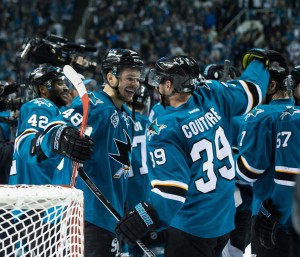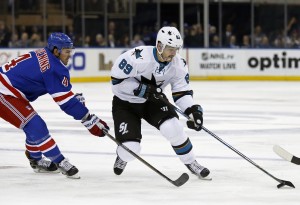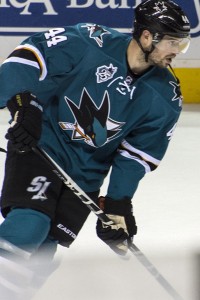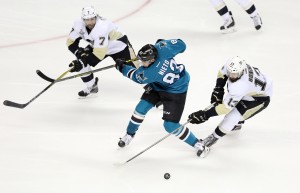After covering San Jose’s approach to the first quarter of the 2016-17 season, I will now take a look into the two issues which seem to garner the most attention: scoring and the Sharks’ history of slow starts.
History Repeating?
Some may think the Sharks are merely duplicating last season’s slow start. For many reasons, this is a bit of an apples and oranges comparison.
Last season, San Jose was integrating more new players than this season. In addition, there was a new system to learn under a new head coach with a completely new coaching staff.

Two important players were problematic for San Jose in the early part of last season. High-end forward Logan Couture was injured after the fourth game, missing about 30 games in the first half of last season. Brent Burns, meanwhile, was an offensive force, but a disaster on defense early last season. Burns made a stunning and sharp defensive turnaround in January.
This season, Burns has shown a bit of defensive regression from last year, but he is still far better than he was a year ago. And Couture, like almost every Sharks player, has been healthy for the first part of the season.
As was highlighted in Part 1, this is the oldest team in the league and despite coming off a very short offseason, it is among the healthiest. San Jose is defying the odds for now, but it is a long season.
The Sharks had not lost a man-game to any of their top nine forwards until their 18th game. Unfortunately, the injured player, Tomas Hertl, appears poised to miss considerable time and is now on injured reserve. The Sharks have not lost a man-game on the blue line, as they have gone with the same unit every game this year. Both goalies have been healthy all season.
Step Changes
Last year, Burns’ improvement, the return of a healthy Couture and the full understanding of head coach Peter DeBoer’s system were ‘step change’ improvements. Individually, each improvement made the team a good bit better. Collectively, they made the Sharks a lot better. The Sharks do not seem to have similar ‘step change’ improvement opportunities this season. Sure, players may improve, and AHL call-ups may contribute. But these seem to be less-powerful movers than those from last season.

Still, there is some potential for improvements. The most likely player to take a major step is talented winger Mikkel Boedker, who is vastly underachieving expectations early this season. The second potential step change is the Sharks’ play on home ice. The Sharks, brilliant on the road last season (and unlikely to repeat that level of success), have already completed some of their more significant road trips. If they can recapture the home ice advantage Sharks teams have enjoyed in most seasons (though not the last two), this can provide a helpful tailwind.
Scoring Droughts?
Many analysts are pointing to San Jose’s lack of scoring. It is fair game. Few are pointing to how difficult it has been for other teams to score against San Jose.
In 19 games, the Sharks have only scored four goals into a manned net twice this season. The first time came in a loss, 7-4, to the Rangers. The second time came in a 4-0 win on Monday night against a depleted New Jersey team (it took an ‘own goal’ to get to four; more on the fourth goal in the notes below).

There is another, better side of the story. The Sharks have given up three or fewer goals in 17 of 19 games. The only exceptions are the aforementioned Ranger game and a 5-0 loss to Pittsburgh.
The Sharks have given up exactly three goals to an opponent six times. 11 times, the Sharks have surrendered two goals or fewer. In those 11 games where they have held opponents to two goals or less, the Sharks are 10-1-0. In the games where they have given up three goals, they are 0-5-1. And 0-2-0 in the games giving up more than three.
The good news is San Jose has already shown it can execute the most challenging part of the NHL game: play a stingy defense. Further helping, the penalty kill has been superb. The Sharks have also been good at staying out of the penalty box, indicating good team discipline. The result is they have allowed a net of just five goals to opposing power plays, third-best in the league. They are also among the best in the league for fewest shots allowed on the penalty kill.
For all the hand-wringing about the Sharks’ underwhelming power play, the Sharks are plus-3 on special teams (counting all special teams goals, for and against, including shorthanded goals). This scales to a plus-13 on special teams over a full 82 game season. Last season, San Jose was plus-15 on special teams. In reality, the Sharks’ special teams are tracking towards the same differential as last season. Fewer goals scored, but also fewer goals allowed.
One expects the even-strength offense will start to click at some point. The talent is simply too good. The accompanying question matters as well: will the defense hold up if wear and tear start to diminish the team? A completely healthy team for the first 15 games has now lost two starting forwards in the last four games (Melker Karlsson should return soon; Tomas Hertl will be out awhile).
The Outlook

People will point to San Jose’s slow start in 2015-16 and think history can repeat in 2016-17. But there is reason for concern.
This is not a particularly fast team in a league moving quickly towards speed. In support of this concern are the three games against teams noted for their speed game, two against Pittsburgh and one against the Rangers. In these three games, all losses, San Jose has been outscored 15-6.

The Sharks will be hard-pressed to find the ‘step changes’ which occurred last season within the organization. If general manager Doug Wilson sees the need for a step change, a trade might be in the offing. Even without a step change, the Sharks are likely to remain competitive in their weak division, but not likely to be competitive with the league’s better teams.
Should the Sharks pick up the scoring pace without compromising their defensive effectiveness, this team can become among the better teams in the Western Conference and perhaps take the top spot in the Pacific Division.
In the third and last part of the series, I will look at some key adjustments the Sharks can make which can result in a difference in their season.
Zeke’s Notes
The Sharks were credited with scoring four goals against New Jersey on Monday night, only the second time all season they got four goals past a goalie. To be fair, though, it is hard to give the Sharks credit for getting the fourth goal past the Devils’ netminder. It was an ‘own goal’, as the Devils player tapped the puck into his own net. But to make it even more bizarre, before attempting to pass the puck back to the goalie, the puck hit the player’s right skate. Then his left skate. Then he attempted to tap the puck to his goalie from just a few feet away. All in all, it was the sort of play one expects to see in the ‘not top 10′ highlights.
If you heard shouts of joy on Tuesday afternoon, they might well have come from Sharks fans cheering the re-signing of the most interesting man in hockey, Brent Burns. Burns inked a $64 million, eight-year deal. I’ll offer a quick first impression. The annual money is fair to both player and team. The contract is a bit on the longer side, as it will end when he is 40. I thought a perfect deal would have been five years at a bit north of $40 million. Had Burns hit the open market, $10 million per year for five years would have been reasonable.
San Jose is in good position to retain key players, with contracts expiring in the next few seasons. Next up is Joe Thornton. I expect Burns’ signing has given San Jose the cost certainty needed to close a deal with Thornton, and this deal will happen shortly.